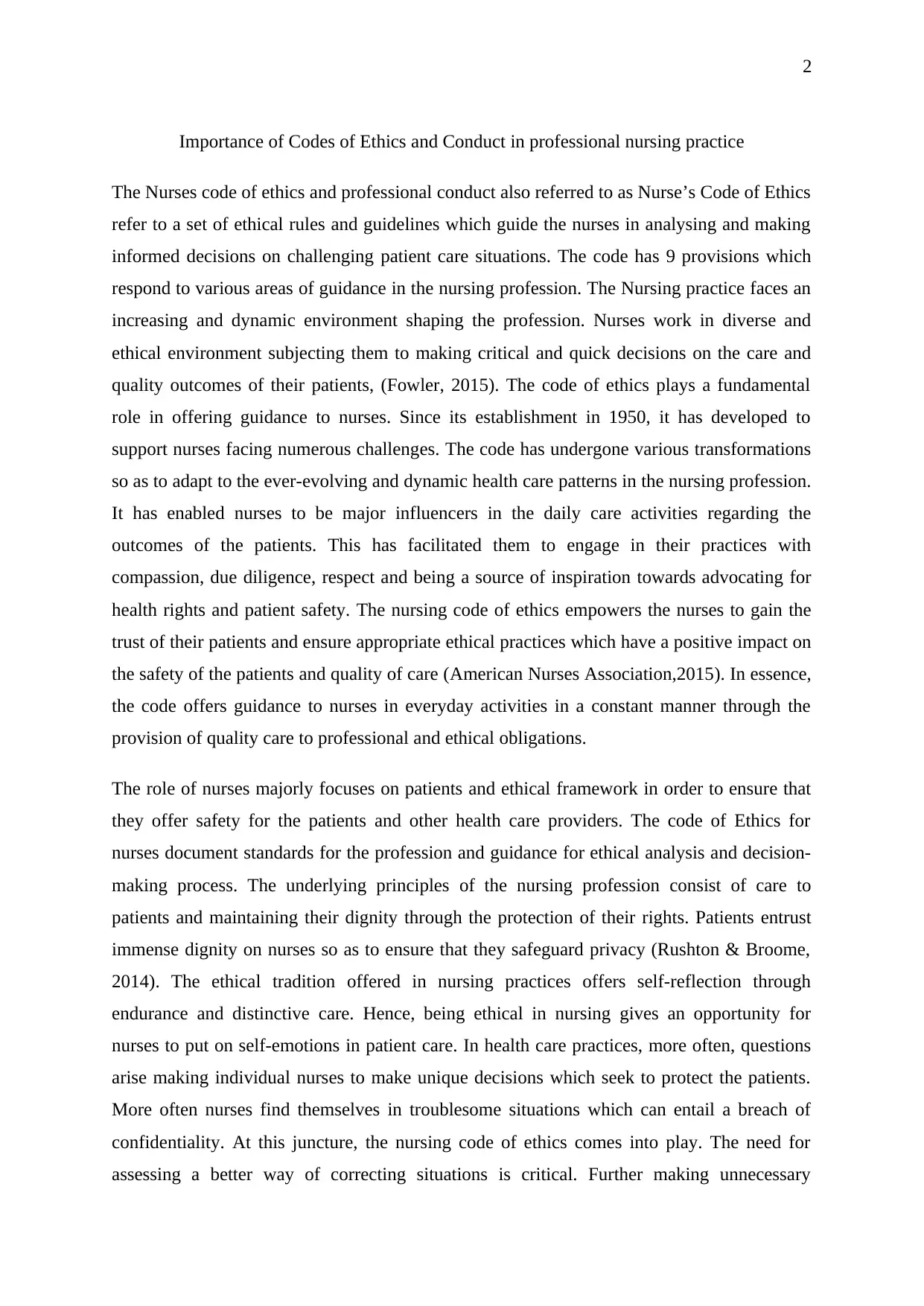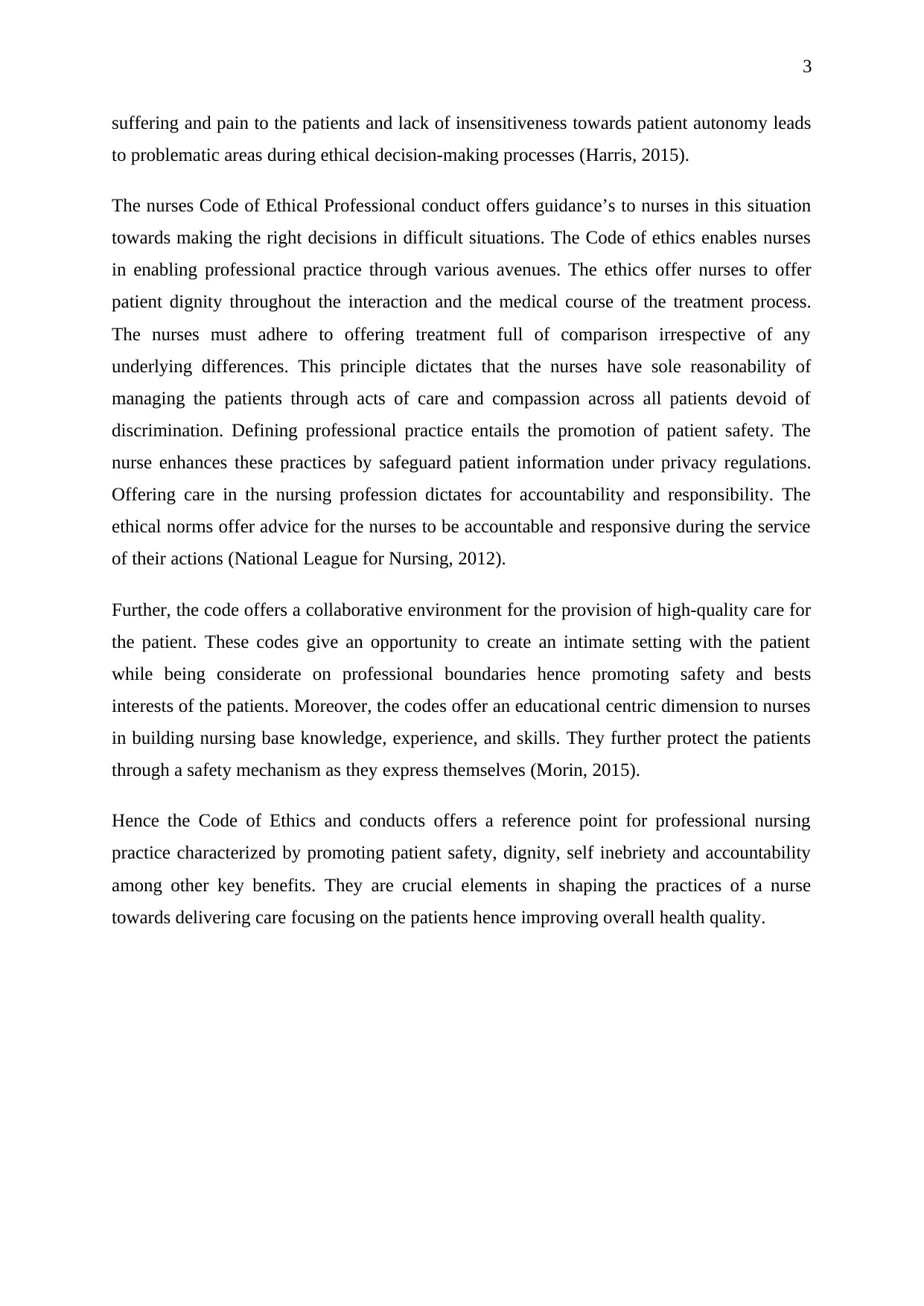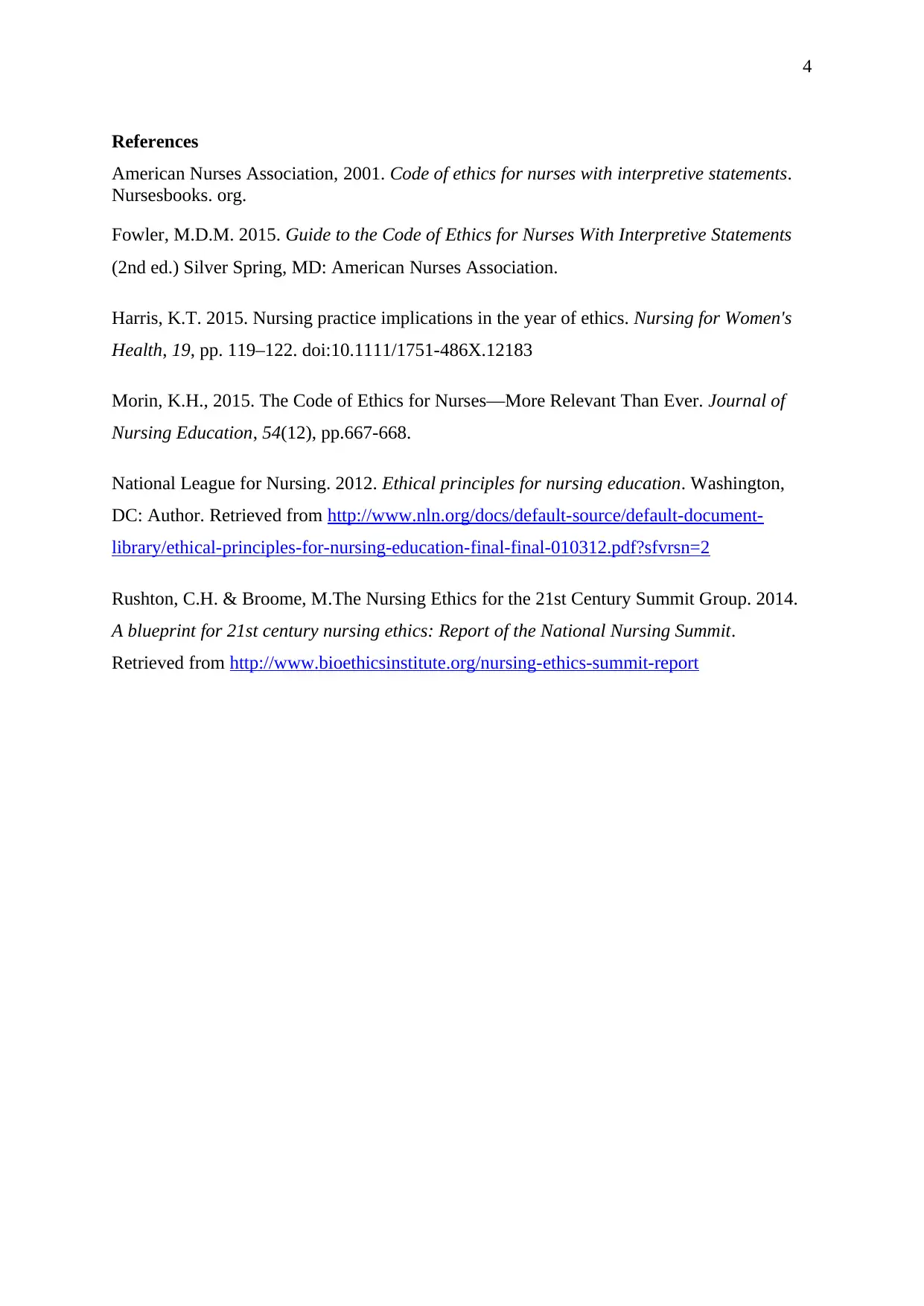Exploring the Importance of Ethics and Conduct Codes in Nursing
VerifiedAdded on 2023/04/21
|4
|998
|230
Essay
AI Summary
This essay explores the critical role of codes of ethics and professional conduct in nursing practice. It highlights how these codes, particularly the Nurse’s Code of Ethics, guide nurses in making informed decisions regarding patient care, especially in challenging situations. The essay emphasizes the evolving nature of the nursing profession and how the code of ethics has adapted to meet the dynamic healthcare environment. It further discusses how adherence to these codes fosters patient trust, ensures ethical practices, and positively impacts patient safety and care quality. The essay also covers the importance of patient dignity, privacy, and the nurse's accountability and responsibility in maintaining ethical standards, concluding that these codes are fundamental to promoting patient safety, dignity, and professional integrity in nursing.

Review
University
Unit
Name
Tutor
University
Unit
Name
Tutor
Paraphrase This Document
Need a fresh take? Get an instant paraphrase of this document with our AI Paraphraser

2
Importance of Codes of Ethics and Conduct in professional nursing practice
The Nurses code of ethics and professional conduct also referred to as Nurse’s Code of Ethics
refer to a set of ethical rules and guidelines which guide the nurses in analysing and making
informed decisions on challenging patient care situations. The code has 9 provisions which
respond to various areas of guidance in the nursing profession. The Nursing practice faces an
increasing and dynamic environment shaping the profession. Nurses work in diverse and
ethical environment subjecting them to making critical and quick decisions on the care and
quality outcomes of their patients, (Fowler, 2015). The code of ethics plays a fundamental
role in offering guidance to nurses. Since its establishment in 1950, it has developed to
support nurses facing numerous challenges. The code has undergone various transformations
so as to adapt to the ever-evolving and dynamic health care patterns in the nursing profession.
It has enabled nurses to be major influencers in the daily care activities regarding the
outcomes of the patients. This has facilitated them to engage in their practices with
compassion, due diligence, respect and being a source of inspiration towards advocating for
health rights and patient safety. The nursing code of ethics empowers the nurses to gain the
trust of their patients and ensure appropriate ethical practices which have a positive impact on
the safety of the patients and quality of care (American Nurses Association,2015). In essence,
the code offers guidance to nurses in everyday activities in a constant manner through the
provision of quality care to professional and ethical obligations.
The role of nurses majorly focuses on patients and ethical framework in order to ensure that
they offer safety for the patients and other health care providers. The code of Ethics for
nurses document standards for the profession and guidance for ethical analysis and decision-
making process. The underlying principles of the nursing profession consist of care to
patients and maintaining their dignity through the protection of their rights. Patients entrust
immense dignity on nurses so as to ensure that they safeguard privacy (Rushton & Broome,
2014). The ethical tradition offered in nursing practices offers self-reflection through
endurance and distinctive care. Hence, being ethical in nursing gives an opportunity for
nurses to put on self-emotions in patient care. In health care practices, more often, questions
arise making individual nurses to make unique decisions which seek to protect the patients.
More often nurses find themselves in troublesome situations which can entail a breach of
confidentiality. At this juncture, the nursing code of ethics comes into play. The need for
assessing a better way of correcting situations is critical. Further making unnecessary
Importance of Codes of Ethics and Conduct in professional nursing practice
The Nurses code of ethics and professional conduct also referred to as Nurse’s Code of Ethics
refer to a set of ethical rules and guidelines which guide the nurses in analysing and making
informed decisions on challenging patient care situations. The code has 9 provisions which
respond to various areas of guidance in the nursing profession. The Nursing practice faces an
increasing and dynamic environment shaping the profession. Nurses work in diverse and
ethical environment subjecting them to making critical and quick decisions on the care and
quality outcomes of their patients, (Fowler, 2015). The code of ethics plays a fundamental
role in offering guidance to nurses. Since its establishment in 1950, it has developed to
support nurses facing numerous challenges. The code has undergone various transformations
so as to adapt to the ever-evolving and dynamic health care patterns in the nursing profession.
It has enabled nurses to be major influencers in the daily care activities regarding the
outcomes of the patients. This has facilitated them to engage in their practices with
compassion, due diligence, respect and being a source of inspiration towards advocating for
health rights and patient safety. The nursing code of ethics empowers the nurses to gain the
trust of their patients and ensure appropriate ethical practices which have a positive impact on
the safety of the patients and quality of care (American Nurses Association,2015). In essence,
the code offers guidance to nurses in everyday activities in a constant manner through the
provision of quality care to professional and ethical obligations.
The role of nurses majorly focuses on patients and ethical framework in order to ensure that
they offer safety for the patients and other health care providers. The code of Ethics for
nurses document standards for the profession and guidance for ethical analysis and decision-
making process. The underlying principles of the nursing profession consist of care to
patients and maintaining their dignity through the protection of their rights. Patients entrust
immense dignity on nurses so as to ensure that they safeguard privacy (Rushton & Broome,
2014). The ethical tradition offered in nursing practices offers self-reflection through
endurance and distinctive care. Hence, being ethical in nursing gives an opportunity for
nurses to put on self-emotions in patient care. In health care practices, more often, questions
arise making individual nurses to make unique decisions which seek to protect the patients.
More often nurses find themselves in troublesome situations which can entail a breach of
confidentiality. At this juncture, the nursing code of ethics comes into play. The need for
assessing a better way of correcting situations is critical. Further making unnecessary

3
suffering and pain to the patients and lack of insensitiveness towards patient autonomy leads
to problematic areas during ethical decision-making processes (Harris, 2015).
The nurses Code of Ethical Professional conduct offers guidance’s to nurses in this situation
towards making the right decisions in difficult situations. The Code of ethics enables nurses
in enabling professional practice through various avenues. The ethics offer nurses to offer
patient dignity throughout the interaction and the medical course of the treatment process.
The nurses must adhere to offering treatment full of comparison irrespective of any
underlying differences. This principle dictates that the nurses have sole reasonability of
managing the patients through acts of care and compassion across all patients devoid of
discrimination. Defining professional practice entails the promotion of patient safety. The
nurse enhances these practices by safeguard patient information under privacy regulations.
Offering care in the nursing profession dictates for accountability and responsibility. The
ethical norms offer advice for the nurses to be accountable and responsive during the service
of their actions (National League for Nursing, 2012).
Further, the code offers a collaborative environment for the provision of high-quality care for
the patient. These codes give an opportunity to create an intimate setting with the patient
while being considerate on professional boundaries hence promoting safety and bests
interests of the patients. Moreover, the codes offer an educational centric dimension to nurses
in building nursing base knowledge, experience, and skills. They further protect the patients
through a safety mechanism as they express themselves (Morin, 2015).
Hence the Code of Ethics and conducts offers a reference point for professional nursing
practice characterized by promoting patient safety, dignity, self inebriety and accountability
among other key benefits. They are crucial elements in shaping the practices of a nurse
towards delivering care focusing on the patients hence improving overall health quality.
suffering and pain to the patients and lack of insensitiveness towards patient autonomy leads
to problematic areas during ethical decision-making processes (Harris, 2015).
The nurses Code of Ethical Professional conduct offers guidance’s to nurses in this situation
towards making the right decisions in difficult situations. The Code of ethics enables nurses
in enabling professional practice through various avenues. The ethics offer nurses to offer
patient dignity throughout the interaction and the medical course of the treatment process.
The nurses must adhere to offering treatment full of comparison irrespective of any
underlying differences. This principle dictates that the nurses have sole reasonability of
managing the patients through acts of care and compassion across all patients devoid of
discrimination. Defining professional practice entails the promotion of patient safety. The
nurse enhances these practices by safeguard patient information under privacy regulations.
Offering care in the nursing profession dictates for accountability and responsibility. The
ethical norms offer advice for the nurses to be accountable and responsive during the service
of their actions (National League for Nursing, 2012).
Further, the code offers a collaborative environment for the provision of high-quality care for
the patient. These codes give an opportunity to create an intimate setting with the patient
while being considerate on professional boundaries hence promoting safety and bests
interests of the patients. Moreover, the codes offer an educational centric dimension to nurses
in building nursing base knowledge, experience, and skills. They further protect the patients
through a safety mechanism as they express themselves (Morin, 2015).
Hence the Code of Ethics and conducts offers a reference point for professional nursing
practice characterized by promoting patient safety, dignity, self inebriety and accountability
among other key benefits. They are crucial elements in shaping the practices of a nurse
towards delivering care focusing on the patients hence improving overall health quality.
⊘ This is a preview!⊘
Do you want full access?
Subscribe today to unlock all pages.

Trusted by 1+ million students worldwide

4
References
American Nurses Association, 2001. Code of ethics for nurses with interpretive statements.
Nursesbooks. org.
Fowler, M.D.M. 2015. Guide to the Code of Ethics for Nurses With Interpretive Statements
(2nd ed.) Silver Spring, MD: American Nurses Association.
Harris, K.T. 2015. Nursing practice implications in the year of ethics. Nursing for Women's
Health, 19, pp. 119–122. doi:10.1111/1751-486X.12183
Morin, K.H., 2015. The Code of Ethics for Nurses—More Relevant Than Ever. Journal of
Nursing Education, 54(12), pp.667-668.
National League for Nursing. 2012. Ethical principles for nursing education. Washington,
DC: Author. Retrieved from http://www.nln.org/docs/default-source/default-document-
library/ethical-principles-for-nursing-education-final-final-010312.pdf?sfvrsn=2
Rushton, C.H. & Broome, M.The Nursing Ethics for the 21st Century Summit Group. 2014.
A blueprint for 21st century nursing ethics: Report of the National Nursing Summit.
Retrieved from http://www.bioethicsinstitute.org/nursing-ethics-summit-report
References
American Nurses Association, 2001. Code of ethics for nurses with interpretive statements.
Nursesbooks. org.
Fowler, M.D.M. 2015. Guide to the Code of Ethics for Nurses With Interpretive Statements
(2nd ed.) Silver Spring, MD: American Nurses Association.
Harris, K.T. 2015. Nursing practice implications in the year of ethics. Nursing for Women's
Health, 19, pp. 119–122. doi:10.1111/1751-486X.12183
Morin, K.H., 2015. The Code of Ethics for Nurses—More Relevant Than Ever. Journal of
Nursing Education, 54(12), pp.667-668.
National League for Nursing. 2012. Ethical principles for nursing education. Washington,
DC: Author. Retrieved from http://www.nln.org/docs/default-source/default-document-
library/ethical-principles-for-nursing-education-final-final-010312.pdf?sfvrsn=2
Rushton, C.H. & Broome, M.The Nursing Ethics for the 21st Century Summit Group. 2014.
A blueprint for 21st century nursing ethics: Report of the National Nursing Summit.
Retrieved from http://www.bioethicsinstitute.org/nursing-ethics-summit-report
1 out of 4
Related Documents
Your All-in-One AI-Powered Toolkit for Academic Success.
+13062052269
info@desklib.com
Available 24*7 on WhatsApp / Email
![[object Object]](/_next/static/media/star-bottom.7253800d.svg)
Unlock your academic potential
Copyright © 2020–2025 A2Z Services. All Rights Reserved. Developed and managed by ZUCOL.





